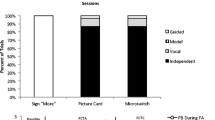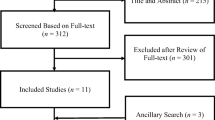Abstract
Proficiency is a mand-specific variable that has been shown to affect treatment outcomes during functional communication training (FCT; i.e., Ringdahl et al. in Research in Developmental Disabilities, 30, 330–341, 2009). Although Ringdahl et al. Research in Developmental Disabilities, 30, 330–341 (2009) showed mand proficiency was predictive of FCT effectiveness, the study targeted a single function of problem behavior. Thus, questions remain about the extent to which mand proficiency is consistent across mands related to multiple functions of problem behavior during both pre-treatment mand topography assessments and subsequent FCT. We assessed mand proficiency via mand topography assessments with individuals with autism and histories of engagement in multiply maintained problem behavior. The results suggested that mand proficiency pertaining to specific mand topographies varied across functions of problem behavior. Next, we conducted FCT using high and low-proficiency mands across all functions of problem behavior. Idiosyncratic results were observed within and across functions of problem behavior with both participants in terms of the effects of high and low-proficiency mand topographies. Implications are discussed in terms of FCT and the selection of mand topographies to target during FCT.





Similar content being viewed by others
References
Bailey, J., McComas, J. J., Benavides, C., & Lovascz, C. (2002). Functional assessment in a residential setting: Identifying an effective communicative replacement response for aggressive behavior. Journal of Developmental and Physical Disabilities, 14, 353–369. https://doi.org/10.1023/A:1020382819146.
Carr, E. G., & Durand, V. M. (1985). Reducing behavior problems through functional communication training. Journal of Applied Behavior Analysis, 18, 111–126. https://doi.org/10.1901/jaba.1985.18-111.
Fisher, W., Piazza, C., Cataldo, M., Harrell, R., Jefferson, G., & Conner, R. (1993). Functional communication training with and without extinction and punishment. Journal of Applied Behavior Analysis, 26, 23–36. https://doi.org/10.1901/jaba.1993.26-23.
Hagopian, L. P., Fisher, W. W., Sullivan, M. T., Acquisto, J., & LeBlanc, L. A. (1998). Effectiveness of functional communication training with and without extinction and punishment: A summary of 21 inpatient cases. Journal of Applied Behavior Analysis, 31, 211–235. https://doi.org/10.1901/jaba.1998.31-211.
Horner, R. H., & Day, H. M. (1991). The effects of response efficiency on functionally equivalent competing behaviors. Journal of Applied Behavior Analysis, 24, 719–732. https://doi.org/10.1901/jaba.1991.24-719.
Iwata, B. A., Dorsey, M. F., Slifer, K. J., Bauman, K. E., & Richman, G. S. (1994). Toward a functional analysis of self-injury. Journal of Applied Behavior Analysis, 27, 197–209. https://doi.org/10.1901/jaba.1994.27-197.
Kazdin, A. E. (1982). Single case research designs: Methods for clinical and applied settings. Oxford: New York.
Love, J. R., Carr, J. E., & LeBlanc, L. A. (2009). Functional assessment of problem behavior in children with autism spectrum disorders: A summary of 32 outpatient cases. Journal of Autism and Developmental Disorders, 39, 363–372. https://doi.org/10.1007/s10803-008-0633-z.
Northup, J., Wacker, D., Sasso, G., Steege, M., Cigrand, K., Cook, J., & DeRaad, A. (1991). A brief functional analysis of aggressive and alternative behavior in an outclinic setting. Journal of Applied Behavior Analysis, 24, 509–522. https://doi.org/10.1901/jaba.1991.24-509.
O’Reilly, M., Rispoli, M., Davis, T., Machalicek, W., Lang, R., Sigafoos, J., et al. (2010). Functional analysis of challenging behavior in children with autism spectrum disorders: A summary of 10 cases. Research in Autism Spectrum Disorders, 4, 1–10. https://doi.org/10.1016/j.rasd.2009.07.001.
Reese, R. M., Richman, D. M., Zarcone, J., & Zarcone, T. (2003). Individualizing functional assessments for children with autism: The contribution of perseverative behavior and sensory disturbances to disruptive behavior. Focus on Autism and Other Developmental Disabilities, 18, 87–92. https://doi.org/10.1177/108835760301800202.
Ringdahl, J. E., Falcomata, T. S., Christensen, T. J., Bass-Ringdahl, S. M., Lentz, A., Dutt, A., & Schuh-Claus, J. (2009). Evaluation of a pre-treatment assessment to select mand topographies for functional communication training. Research in Developmental Disabilities, 30, 330–341. https://doi.org/10.1016/j.ridd.2008.06.002.
Roane, H. S., Vollmer, T. R., Ringdahl, J. E., & Marcus, B. A. (1998). Evaluation of a brief stimulus preference assessment. Journal of Applied Behavior Analysis, 31, 605–620. https://doi.org/10.1901/jaba.1998.605-620.
Tiger, J. H., Hanley, G. P., & Bruzek, J. (2008). Functional communication training: A review and practical guide. Behavior Analysis in Practice, 1, 16–23.
Wacker, D. P., Steege, M. W., Northup, J. A., Sasso, G., Berg, W., Reimers, T., et al. (1990). A component analysis of functional communication training across three topographies of severe behavior problems. Journal of Applied Behavior Analysis, 23, 417–429. https://doi.org/10.1901/jaba.1990.23-417.
Wacker, D. P., Harding, J. W., Berg, W. K., Lee, J. F., Schieltz, K. M., Padilla, Y. C., et al. (2011). An evaluation of persistence of treatment effects during long term treatment of destructive behavior. Journal of the Experimental Analysis of Behavior, 96, 261–282. https://doi.org/10.1901/jeab.2011.96-261.
Winborn, L., Wacker, D. P., Richman, D. M., Asmus, J., & Geier, D. (2002). Assessment of mand selection for functional communication training packages. Journal of Applied Behavior Analysis, 35, 295–298. https://doi.org/10.1901/jaba.2002.35-295.
Winborn-Kemmerer, L., Ringdahl, J. E., Wacker, D. P., & Kitsukawa, K. (2009). A demonstration of individual preference for novel mands during functional communication training. Journal of Applied Behavior Analysis, 42, 185–189. https://doi.org/10.1901/jaba.2009.42-185.
Author information
Authors and Affiliations
Corresponding author
Ethics declarations
Ethical Approval
All procedures performed in studies involving human participants were in accordance with the ethical standards of the institutional and/or national research committee and with the 1964 Helsinki declaration and its later amendments or comparable ethical standards.
Informed Consent
Informed consent was obtained from all individual participant’s legal guardians included in the study.
Conflicts of Interest
All authors report no conflicts of interest.
Rights and permissions
About this article
Cite this article
Falcomata, T.S., Shpall, C.S., Ringdahl, J.E. et al. A Comparison of High and Low-Proficiency Mands During Functional Communication Training Across Multiple Functions of Problem Behavior. J Dev Phys Disabil 29, 983–1002 (2017). https://doi.org/10.1007/s10882-017-9571-z
Published:
Issue Date:
DOI: https://doi.org/10.1007/s10882-017-9571-z




